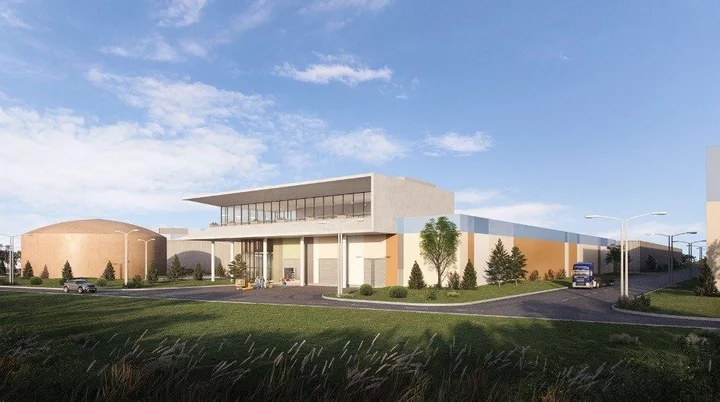Conceptual image showing Nordic Aquafarms’ planned facilities on the Samoa Peninsula. | Image via County of Humboldt.
###
Last week, the Humboldt County Planning Commission unanimously voted to certify the Environmental Impact Report (EIR) and issue a coastal development permit to Nordic Aquafarms California, LLC, a subsidiary of Norway-based Nordic Aquafarms, which intends to build a 766,530-square-foot recirculating aquaculture system (RAS) facility on the Samoa Peninsula.
After the decision, we reached out to a number of leaders of local environmental organizations who have criticized the project to ask for their responses. To a person, they deferred commenting until after meeting yesterday morning to discuss the matter. Yesterday evening they emailed a joint media statement, which we’ve published below.
Asked if they plan to appeal the Planning Commission’s decision to the Humboldt County Board of Supervisors, Humboldt Baykeeper Director Jennifer Kalt replied via email, “We’re still contemplating that question.”
Below is the media statement, which was sent on behalf of Humboldt Baykeeper, Northcoast Environmental Center, Coalition for Responsible
Transportation Priorities, 350 Humboldt and the Environmental Protection Information Center (EPIC):
On Thursday August 4th, the Humboldt County Planning Commision approved a conditional permit for the proposed Nordic Aquafarms project and certified the project’s Environmental Impact Report (EIR).
Our organizations—Humboldt Baykeeper, Northcoast Environmental Center, Coalition for Responsible Transportation Priorities, 350 Humboldt, and EPIC—have engaged with the proposed Nordic Aquafarms from its inception. The project, unprecedented in size and design, has rightfully drawn critical attention.
While the project has the potential to negatively impact the environment, our organizations have not opposed it because redevelopment of the existing site would require remediation of a contaminated former pulp mill site, which we see as beneficial to the community and the environment. Instead, our organizations have focused our efforts on working with Nordic to improve the project by reducing the impacts.
Our engagement with the project over the past three years has led to some improvements, including:
- Commitments to purchase renewable energy for the project;
- More monitoring of ocean waters near the effluent discharge;
- Employee commute programs to help reduce the greenhouse gas impact of 100+ employees driving single-occupancy vehicles to the site.
Although we were successful in getting these improvements, there remain significant unresolved issues that we intend to continue to address, including greenhouse gas emissions related to fish feed, increased truck traffic and associated safety, coastal access and tailpipe emissions impacts, and the impacts to the aquatic environment from the bay intake and ocean discharge.
Our organizations will continue to exhaust all opportunities to improve the project through the Coastal Commission and the Regional Water Quality Control Board, as well as seeking voluntary improvements to the project with Nordic.
The recent reorganization of company leadership and the fact that Nordic California LLC has split from its parent company, coupled with the fact that Nordic CEO Bernt-Olav Rottingsnes was quoted in July 2022 saying, “I think it is fair to say the banks still think it is too early to lend to land-based fish farming,” make us increasingly skeptical of Nordic’s financial ability to pull off a project of this magnitude.
Although Nordic claims that this technology is tested, they have yet to embark on a project of this size. Nevertheless, our organizations will continue to push for improvements and resolutions to the outstanding issues as long as the project continues to move forward.

CLICK TO MANAGE